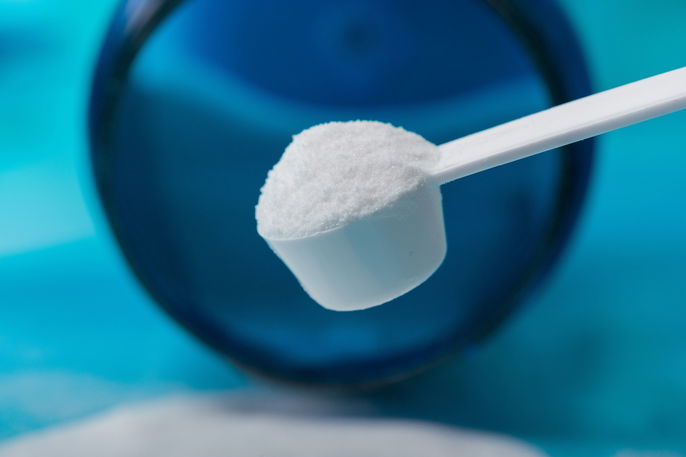Dextrose is a simple carbohydrate that is converted into glucose and rapidly absorbed by the body. It is highly recommended as a dietary supplement to improve performance and build muscle mass in athletes and people who engage in high-intensity exercise.
Dextrose is also used to sweeten processed foods and, in the hospital setting, to prevent or treat hypoglycemia, a condition in which blood sugar levels are very low, causing dizziness, confusion, and fainting.
Dextrose is sold in supplement stores and pharmacies and can be consumed during or immediately following a workout. Dextrose can be diluted in water, taken by itself, or used in combination with other supplements like BCAA and whey protein.

Indications for use
Dextrose is primarily recommended for:
1. Improving exercise performance
Dextrose is a simple carbohydrate that is rapidly absorbed by the body and increases energy levels during high-intensity exercise like marathons, swimming, soccer, and high-intensity interval training (HIIT).
2. Building muscle mass
Dextrose is a quick source of energy for the body, improving physical performance during exercise and helping build muscle mass.
When taken after a workout, dextrose provides energy to the muscles that helps with muscle recovery and muscle growth.
3. Preventing loss of lean muscle mass
Dextrose prevents the breakdown of lean muscle mass, a process known as catabolism, in people who eat few carbs and/or engage in high-intensity forms of exercise for prolonged periods of time. This is because the body will start to break down muscle if there is not enough glucose in the body, as muscle can be broken down into amino acids and then converted to glucose.
4. Treating hypoglycemia
Dextrose is used in the hospital in the form of a gel or intravenous (IV) solution to increase blood sugar levels and help treat hypoglycemia.
5. Preventing malnutrition
Dextrose is a source of parenteral nutrition that is administered along with amino acids and fat to prevent malnutrition. Parenteral nutrition is given through an IV for people who are unable to eat or digest food normally.
6. Sweetening foods
Dextrose is used by the food industry to sweeten foods like cakes, ice cream, and yogurt, in addition to being used to neutralize spicy and salty flavors and extend shelf life.
Different types
Dextrose comes in two different forms: dextrose monohydrate and anhydrous dextrose.
Dextrose monohydrate is primarily used as a dietary supplement (in the form of a powder) or as a sweetener and preservative in processed foods.
Anhydrous dextrose is primarily used in medicine, in the form of IV solutions, gels, or pills to prevent or treat hypoglycemia or as a source of energy for people who are unable to eat by mouth.
Dextrose vs maltodextrin
Maltodextrin is a carbohydrate that is rapidly absorbed by the body and is recommended to improve physical performance and build muscle mass in people who engage in high-endurance activities like soccer or running, or strength training exercises like weightlifting and calisthenics.
Dextrose is a simple carbohydrate that is rapidly converted into glucose and absorbed by the body, and is generally recommended to support muscle recovery in people practicing high-intensity forms of exercise like marathon running, cycling, soccer, basketball, and HIIT.
How to take
The general recommendation is to take dextrose supplements either during or immediately following a workout. The recommended dose is typically 30 g of dextrose diluted in 200 to 300 mL of water or another beverage.
Dextrose can also be consumed with high-protein foods like meat, chicken, or eggs or with protein supplements like BCAA or whey protein to help build muscle mass.
Dextrose in the form of IV solutions, gels, and pills should only be used in the hospital setting under the guidance of a medical professional.
Does dextrose cause weight gain?
Dextrose is simple carbohydrate and a high glycemic index food that can lead to weight gain through the accumulation of body fat, primarily when consumed by people who do not exercise and/or do not follow a healthy, well-balanced diet.
Side effects
Excess consumption of dextrose can cause diarrhea, cramps, nausea, and gas, and can also lead to weight gain, insulin resistance, and diabetes.
IV dextrose can cause an increase in blood sugar, pain and redness at the injection site, thrombosis, or thrombophlebitis.
Contraindications to use
People with an allergy to corn should not take dextrose. People who are pregnant or breastfeeding, older adults, children, and people with diabetes or other health problems should only take dextrose if approved by their healthcare provider or a registered dietitian.






























